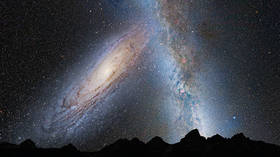‘Of course we are not alone’: Russian scientist says we’re using wrong tools to hunt for aliens

A Russian scientist believes that the only way we can finally discover extraterrestrial life is for experts and researchers from different branches to work together.
Alexander Panov, a leading researcher at Moscow State University’s Research Institute of Nuclear Physics, has spent many years working on the Search for Extraterrestrial Intelligence (SETI) at the Scientific Council of the Russian Academy of Sciences in Radio Astronomy.
In a recent interview, he laments the lack of interaction between researchers involved in both the searches for biological and for intelligent life out in the universe, and called for greater cooperation and pooling of resources between these two distinct fields, which have essentially the same goal: find aliens.
“Of course we are not alone,” Panov boldly states. “The question is not whether they exist, but where they exist.”
Also on rt.com WATCH: UFO spotted in skies over Mexican volcano seconds after ERUPTIONWhile some scientists and astronomers look for exoplanets in the ‘goldilocks zone’ of their respective star, some examine planets' atmospheres in search of biosignatures, and others hunt for signals of alien origin – but Panov says there is little crossover and collaboration between these groups of researchers.
The method of identifying candidate stars and observing their planets for a short period before moving on to another candidate once no signals are detected is fundamentally flawed, he says, citing our own planet as a prime example.
“Perhaps on one of the planets of this star there is a highly developed civilization that is able to send messages to space but, like us, does not have the energy capabilities to transmit continuously to all the stars in the area.”
Also on rt.com UFOpen for business: Britain’s Royal Air Force to declassify X-Files kept in secret for yearsInstead of only transmitting signals in a given direction in short bursts, he suggests round-the-clock scanning of the entire sky, using a planet-wide network of receiving stations – though he acknowledges there are flaws here as well.
He suggests that it’s entirely possible that a number of advanced civilizations have created a quarantine zone around us, complete with a radio blackout, so as not to interfere with our independent development.
Panov says astroarchaeology is hugely important to determine whether extraterrestrial life has visited us over the past tens of millions of years. He suggests that highly detailed photography of the surface of the moon is critical to our investigations of our possible extraterrestrial past.
He is not, however, convinced by any of the UFO 'sightings' he has examined, and believes they can likely be explained away by other phenomena.
Panov also believes that communication between civilizations is entirely possible but may not always be two-way, since some ancient civilizations could have stored their knowledge in a sort of cosmic cloud, which could have survived their extinction and still be present thousands or millions of years later.
Like this story? Share it with a friend!














